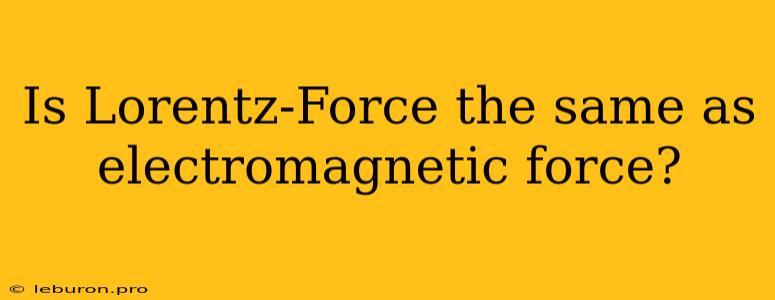The Lorentz force is a fundamental concept in electromagnetism that describes the force experienced by a charged particle moving in an electromagnetic field. This force arises from the interaction between the particle's charge and the electric and magnetic fields. While the Lorentz force and the electromagnetic force are closely related, they are not exactly the same. Understanding the nuances between these two concepts is crucial for comprehending the behavior of charged particles in electromagnetic environments. This article delves into the definition of the Lorentz force, its relationship to the electromagnetic force, and explores the applications of this fundamental concept in various fields.
The Lorentz Force: A Definition
The Lorentz force is the force experienced by a charged particle in an electromagnetic field. It is defined as the vector sum of the electric and magnetic forces acting on the particle. Mathematically, the Lorentz force (F) on a particle with charge (q) moving with velocity (v) in an electric field (E) and a magnetic field (B) is given by:
F = q(E + v × B)
This equation highlights the fundamental nature of the Lorentz force. It demonstrates that the force experienced by the charged particle is directly proportional to its charge (q) and is influenced by both the electric field (E) and the magnetic field (B). The magnetic component of the force depends on the velocity (v) of the particle and is perpendicular to both the velocity and the magnetic field.
Electromagnetic Force: A Broader Perspective
The electromagnetic force is one of the four fundamental forces in nature, alongside the strong nuclear force, the weak nuclear force, and the gravitational force. It governs the interactions between electrically charged particles. The electromagnetic force encompasses both electric and magnetic forces, which are essentially two aspects of the same fundamental force.
The electromagnetic force is responsible for a wide range of phenomena, including:
- Electrostatic interactions: The attraction or repulsion between stationary charged particles.
- Magnetism: The force exerted by moving charges or magnetic fields.
- Electromagnetic radiation: The propagation of light and other electromagnetic waves.
- Chemical bonding: The forces that hold atoms together in molecules.
Distinguishing Lorentz Force from Electromagnetic Force
While the Lorentz force is a component of the electromagnetic force, it specifically refers to the force experienced by a single charged particle moving in a given electromagnetic field. The electromagnetic force, on the other hand, is a more general concept that encompasses all interactions between electrically charged particles, including those at rest.
In essence:
- The Lorentz force is the specific force acting on a single charged particle.
- The electromagnetic force is the broader concept that encompasses all interactions between charged particles.
Applications of the Lorentz Force
The Lorentz force is a fundamental concept with wide-ranging applications in various fields, including:
1. Particle Physics:
- Particle accelerators: The Lorentz force is used to accelerate charged particles in particle accelerators, such as the Large Hadron Collider.
- Mass spectrometry: The Lorentz force is used to separate charged particles based on their mass-to-charge ratio in mass spectrometers.
2. Electrical Engineering:
- Electric motors: The Lorentz force is responsible for the rotation of the rotor in electric motors.
- Electric generators: The Lorentz force is used to generate electricity in generators.
3. Astronomy and Astrophysics:
- Charged particle motion in space: The Lorentz force governs the motion of charged particles in the Earth's magnetic field and in other astrophysical environments.
- Radio waves from space: The Lorentz force is responsible for the emission of radio waves from space by charged particles.
4. Medical Imaging:
- Magnetic Resonance Imaging (MRI): The Lorentz force plays a crucial role in the operation of MRI scanners.
Conclusion
The Lorentz force is a fundamental concept in electromagnetism that describes the force experienced by a charged particle moving in an electromagnetic field. While the Lorentz force and the electromagnetic force are closely related, they are not identical. The Lorentz force is a specific force acting on a single charged particle, while the electromagnetic force encompasses all interactions between charged particles. The Lorentz force has widespread applications in various fields, from particle physics and electrical engineering to astronomy and medical imaging. Its understanding is crucial for comprehending the behavior of charged particles in electromagnetic environments and for developing new technologies based on electromagnetism.
